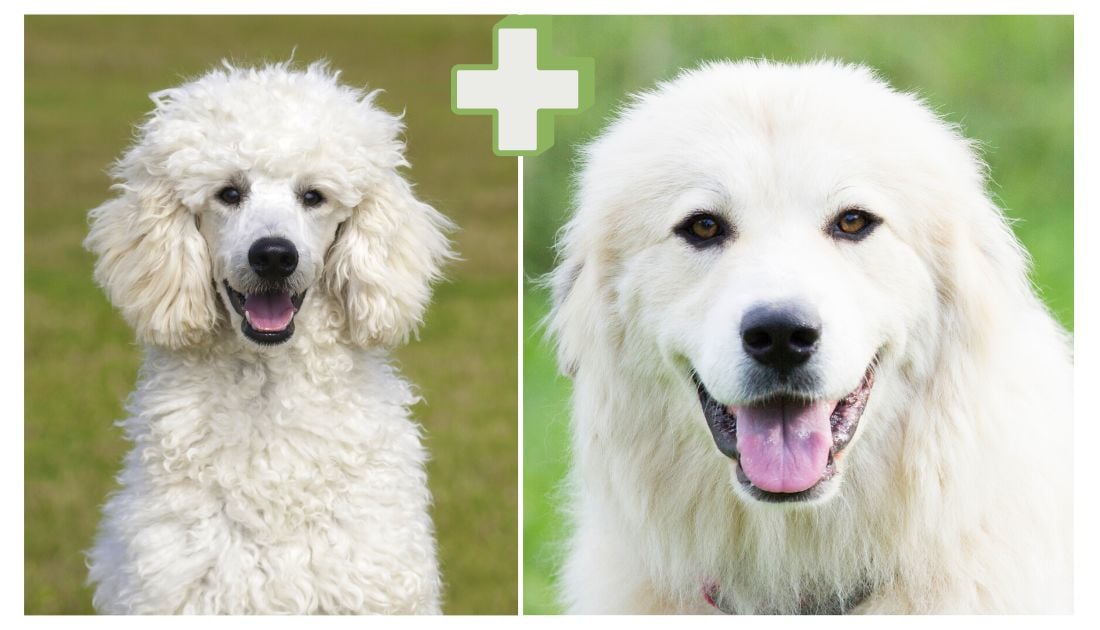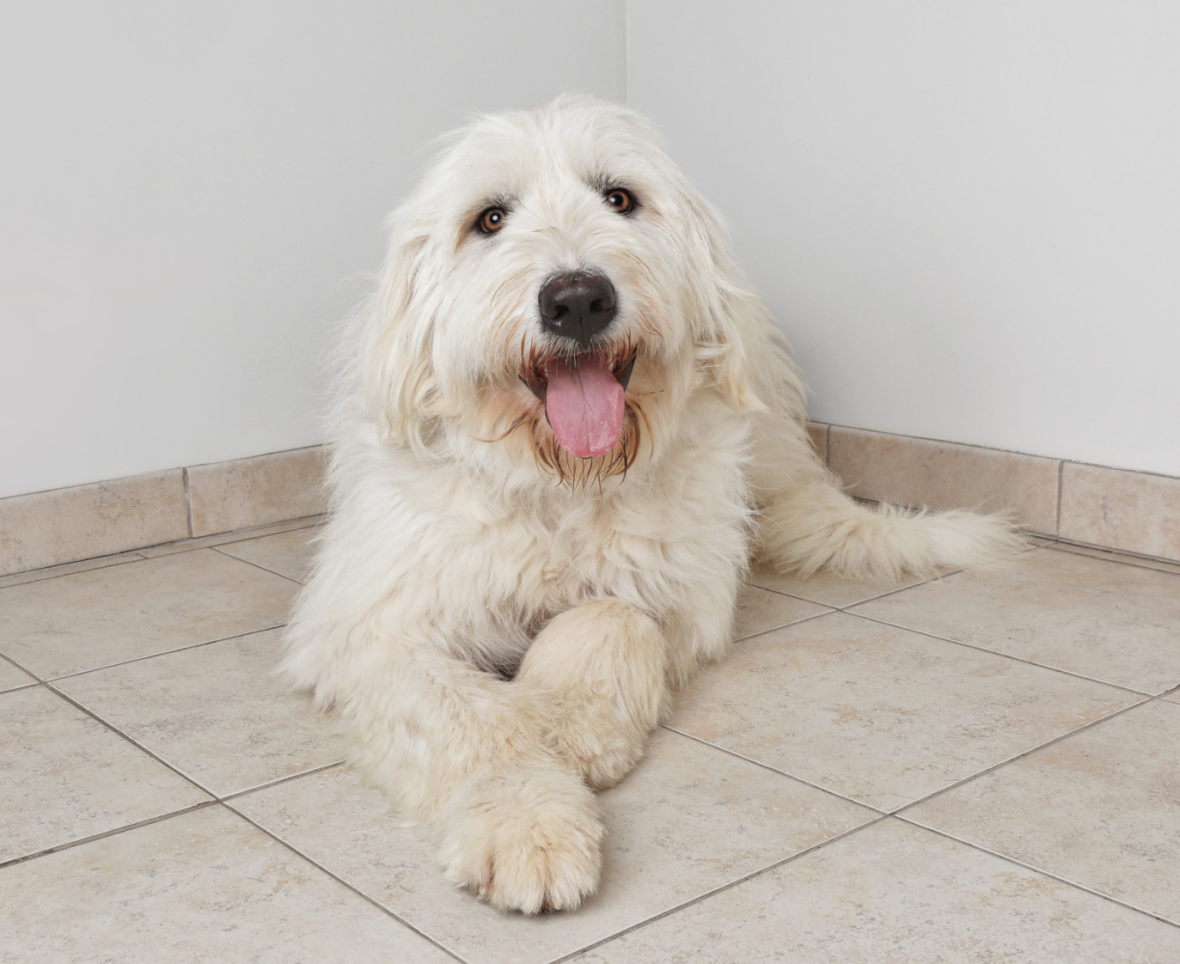Pyredoodle: A Cautionary Tale of Crossbreed Considerations and Challenges
A Pyredoodle is a mixed-breed dog whose parentage includes Great Pyrenees and Standard Poodle. A new “designer” breed, the Pyredoodles are large dogs that attract a lot of attention. Often over 80–100 pounds, Pyredoodles are a commanding presence, despite their often low-key demeanor.

Although stunning and easy to fall in love with, whether or not this mix is right for you is a pretty big question. The guardian instincts and reactive nature of the Great Pyrenees combined with the attentive, sometimes anxious energy of the Standard Poodle aren’t always easy to manage.
Pyredoodle owners need to be ready for a big dog that may have big needs, and these definitely are not the right breed for new dog owners or anyone without guard dog experience.
What Does a Pyredoodle Look Like? Let’s Meet 5 From Instagram
When you mix two breeds, the results can be unpredictable. One Pyredoodle puppy might have dark, tightly curled fur, while others might have thick white coats like their Great Pyrenees parents. Keep this in mind while you scroll through a selection of adorable pups! Each of these five dogs is a Pyredoodle, but you’ll notice they all look slightly different.
1. Oakley
It’s hard to convey just how massive Oakley is in a photo, but you can see he’s taking up the entire back seat! A handsome gentle giant from Southern California, Oakley spends his days playing with his favorite kids, and his favorite cat.
2. Reese
Reese is an F1B Pyredoodle, which means her parents were a Pyredoodle and a Standard Poodle. Still just a pup, Reese has plenty of growing left to do—just look at how big those paws are!
3. Rayne
Source: @RayneThePyredoodle
Rayne (right) is a black Pyredoodle who can always be trusted to take up watch from the balcony when she has a free moment. Here, you see Rayne with her English cream Golden Retriever friend (left)—they’re about the same size.
4. Wolfe
Source: @WolfePrincee
Wolfe lives in Houston where spends his days staying as close to his mom as possible! When he isn’t velcroed to his mom, Wolfe likes to play with other dogs, go to the beach, and keep an eye on what’s happening in the neighborhood.
5. Zoey
Source: @Zoey.And.Murphy.Doodle
Zoey is a Mini Pyredoodle, which means her parents were a Great Pyrenees and a Miniature Poodle. Much smaller than the Standard Pyredoodle, Zoey is definitely a “medium-sized” dog vs. the extra-large ones you’ll find above.
Pyredoodle Basic Info
The Pyredoodle is a “designer” mixed breed dog created by breeding a Great Pyrenees to a Standard Poodle. Unlike purebred dog breeds, mixes like the Pyredoodle are unstandardized, which means there are no specific requirements to which breeders must adhere. With no breed standard, the Pyredoodle is something of a wildcard, in that you can’t be certain exactly what you’re getting when buying one.
Based on our knowledge of both Great Pyrenees and Standard Poodles with input from actual Pyredoodle owners, we can patch together a rough idea of what to expect with a Pyredoodle.
Pyredoodle Temperament
Pyredoodles are a mix of two wildly different breeds.
Great Pyrenees dogs are highly independent watchdogs who have been bred for centuries to make split-second independent choices for the safety of their humans and flocks of animals. Laid back and happy to sprawl in one spot to watch their surroundings for hours, Great Pyrenees are capable of spurts of energy and can be quite explosive when they get going. Although they have strong guardian instincts, Great Pyrenees may not always want to be with their humans and may prefer to spend time alone, and often live entirely outside.
Standard Poodles are very human-focused, and will happily follow commands whether they’re playing a game or doing a job. Intelligent and affectionate, Poodles develop a great love for family, and may sometimes become so attached that they develop separation anxiety. Poodles like to be active mentally and physically, and do best with plenty of interaction, training, and enrichment.
While Pyredoodles may inherit traits from either or both of their parents, the personalities of these two breeds don’t always mix well. The combination of Great Pyrenees skepticism and Standard Poodle neuroticism can produce dogs that are anxious, reactive, and fearful.
“My Pyredoodle is insanely anxious and has been since I brought him home. We’ve seen multiple vets, a behaviorist, and at least a dozen trainers. Nothing has really made a difference”
Reddit comment about a 2-year-old Pyredoodle.
“He never learned to relax in the crate or see it as his safe place. He isn’t food motivated and has extreme anxiety and separation anxiety. The problem is that both extremes of his behavior are completely unpredictable. He loves my grandparents and has been to their house often. When they came to visit our new place, he wouldn’t stop barking at them, cowering, and finally peed on the floor when they tried to touch him.” Another comment from the same user.

On the other hand, some Pyredoodles love family and are tolerant of new people, animals, and experiences. Unfortunately, it really is a mixed bag with this mix.
Pyredoodle Size
How big are Pyredoodles? Well, it depends. Full-grown Pyredoodles can be as large as their Great Pyrenees parents or might inherit a smaller size from their Poodle size.
In general, most Pyredoodles will be around 22–32 inches tall and around 80–110 pounds in weight. That’s a big dog!
Mini Pyredoodles are smaller, usually between 40–-80 pounds, but some may be larger depending on how they were bred.
Pyredoodle Health
Like other qualities of the Pyredoodle, the health of this mixed breed dog isn’t exactly predictable. While some will inherit no health problems from their parents, others will get breed-specific health issues from both sides of their genetic makeup. Most commonly, Pyredoodles are susceptible to:
- Hip and joint problems (e.g. hip/elbow dysplasia, patellar luxation, Legg-Calve-Perthes disease)
- Bloat
- Cushing’s disease
- Eye and vision issues (e.g. conjunctivitis, cataracts)
- Ear infections
- Cancer
Where To Find Pyredoodle Puppies
It is nearly impossible to find truly reputable breeders of Pyredoodle puppies. Unfortunately, the world of designer dogs is dominated by backyard breeders. While many are well-intentioned, they lack the knowledge and experience needed to safely and ethically breed dogs. We do not recommend trying to buy a Pyredoodle puppy or searching for Pyredoodle breeders.
If you’ve fallen in love with Pyredoodles, we suggest looking into livestock guardian dog rescue organizations in your area.
Pyredoodle FAQ
Do you have more questions about the Great Pyrenees Poodle mix? You’re in luck! We have lots more to say about the Pyredoodle.
Do Pyredoodles shed?
Yes. While some Pyredoodles may be low-shedding dogs, most will shed at least a little, and many will be moderate to heavy shedders. Great Pyrenees have thick, heavy double coats, and drop a large amount of fur once or twice a year as the seasons change.
Even low-shedding Pyredoodles will need to be brushed regularly and should be taken to the groomer every 6–10 weeks. Because Pyredoodles are part livestock guardian dog they may not enjoy being handled by strangers. Finding your Pyredoodle a groomer ASAP is very important, and they’ll need to spend lots of time with your dog to gain their trust.
Are Pyredoodles hypoallergenic?
No. Poodles are sometimes considered hypoallergenic because they are so low shedding that they may trigger fewer allergies for people allergic specifically to dog dander. Great Pyrenees on the other hand are absolutely not hypoallergenic and are moderate to heavy shedders with thick double coats.
How much is a Pyredoodle?
Pyredoodle breeders ask between $1,000–$2,500 for puppies. Remember, it’s best not to support breeders producing “designer” mixed breeds, and if you can find a Pyredoodle for adoption, you’ll pay between $300–$800.
How big do Pyredoodles get?
Fully grown Pyredoodles are almost always above 80 pounds, but some can get as large as 100 pounds plus.
Are Pyredoodles good family dogs?
Fully grown Pyredoodles are almost always above 80 pounds, but some can get as large as 100 pounds plus.
Are Pyredoodles good family dogs?
Sometimes. It’s never a good idea to leave any dog alone with young kids, and the same is true for Pyredoodles. While some may be extremely patient and gentle with kids, others may have much less patience for being poked, prodded, and bothered. To keep your dog and your kids safe, never leave them alone together, and teach your kiddos to respect your dog’s boundaries.
Are Pyredoodles easy to train?
Sometimes. Some Pyredoodles may be eager to please like their Poodle parents, while others will be independently-minded and unimpressed by humans like the Great Pyrenees. Livestock guardian dogs were bred to make their own decisions, so they don’t often look to their humans for instruction. Poodles are quite the opposite, and it’s hard to know which traits your Pyredoodle will inherit.
Can I find Pyredoodles in shelters or rescues?
It is possible to find Pyredoodles in shelters or rescues, although they may be less common than purebred dogs. You can check local shelters, rescue organizations, and online adoption websites.
Do Pyredoodles bark a lot?
Pyredoodles have a tendency to bark to alert their owners of potential intruders or perceived threats. Proper training and socialization can help manage their barking behavior.
Are Pyredoodles suitable for apartment living?
Pyredoodles are large dogs and may not be the best choice for apartment living. They require space to move around and a yard for exercise. However, if given enough exercise and mental stimulation, they can adapt to apartment living.
Do Pyredoodles have any specific grooming needs?
Pyredoodles have a dense, curly or wavy coat that requires regular brushing to prevent matting. They may also need professional grooming to maintain their coat’s condition.
Are Pyredoodles prone to any health issues?
Like all dogs, Pyredoodles can be prone to certain health issues, including hip dysplasia, bloat, and eye problems. Regular vet check-ups and a healthy lifestyle can help minimize risks.
Do Pyredoodles require a lot of exercise?
Pyredoodles are moderately active dogs. They enjoy daily walks, playtime, and mental stimulation. Providing them with around 60 minutes of exercise per day is usually sufficient.
How do Pyredoodles interact with strangers?
Pyredoodles can be cautious with strangers and may exhibit protective behavior. Early socialization is crucial to ensure they are comfortable and well-behaved around new people. Proper training can help them distinguish between genuine threats and harmless situations.
Do Pyredoodles require regular grooming?
Yes, Pyredoodles require regular grooming to keep their coat in good condition. Brushing their curly or wavy coat a few times a week helps prevent matting and tangling. Occasional professional grooming may be necessary to maintain their appearance.
Are Pyredoodles good for first-time dog owners?
Pyredoodles can be suitable for first-time dog owners who are committed to providing proper training, socialization, and exercise. However, they may require more effort and guidance due to their size and exercise needs.
Are Pyredoodles prone to separation anxiety?
Pyredoodles can be prone to separation anxiety if not properly trained and provided with mental stimulation. They thrive in the company of their family and may become anxious when left alone for long periods.
Related Articles:
- 69 Shades of Doodles: Discovering the Charm of These Popular Designer Dogs
- Why Get a Doodle When You Could Get a Poodle Instead?
- Labradoodles Were Invented in the 80s By a Breeder Who Regrets It
- 6 Best Dog Foods For Poodles That Even The Pickiest of Them Will Love



